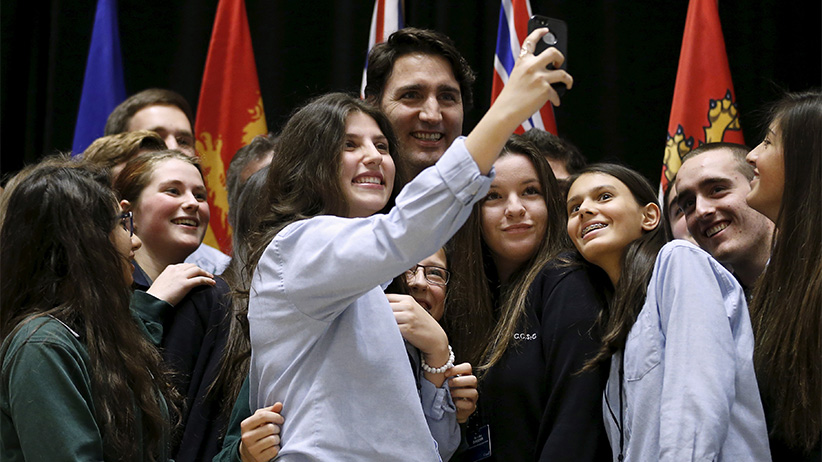Interest in public service jobs has increased since Trudeau’s election
Why would you want to do that? Because job demand is outstripping supply and, hey, there’s stability.
Canada’s Prime Minister Justin Trudeau (C) poses for a selfie with students during the First Ministers’ meeting in Ottawa, Canada November 23, 2015. (Chris Wattie/Reuters)
Share

Katie de Klerk had plans to become a lawyer—until she got hit in the head. It was June 2015 and the LSAT exam she’d been cramming for was less than two weeks away when, during her summer job at a rowing club in Halifax, a piece of equipment struck her skull.
The freak accident was devastating. She sat out the exam, and had to stay in a dark room for six weeks until her headaches finally stopped. During that time, she reflected on what to do next, knowing she didn’t want to wait a year for another crack at the LSAT.
“I came out of the dark room and it was the election,” de Klerk , 22, says. Politicians on the campaign trail were talking about one issue that mattered a lot to her: missing and murdered Indigenous women.
The Truth and Reconciliation Commission had recently released a report recommending a public inquiry into MMIW. De Klerk watched how Liberal Leader Justin Trudeau was outspoken on his plans to follow through on that call to action.
“Making that public commitment was really inspiring to me,” de Klerk says. “The failure to protect and seek justice for such a vulnerable population was something I couldn’t stop thinking about. I decided one way to address issues like that was to pursue a masters in public administration.”
She’s not alone. Not only is enrollment up in public administration fields of study, but now experts say there’s a new enthusiasm among students.
“Let me be blunt. It was miserable under the Harper government,” says Robert Shepherd, a Carleton University professor and president of the Canadian Association of Programs in Public Administration. “Nobody wanted to be there. Our numbers dropped off for [programs] connected to the federal government. It was hard to attract students.”
Now Ottawa seems to be investing in its public service employees, and Trudeau’s big budget means greater job opportunities. So while some might attribute the reason for students’ renewed enthusiasm to a “sunny ways” Prime Minister, the spike in interest for public policy and administration programs isn’t always altruistic.
Shepherd credits the sputtering economy as a common thread he hears from students looking for public service work. “[Students] see government as being a relatively stable way to anchor themselves,” he says. “Back in the 1980s, that’s what I was thinking too. The economy sucked and I saw government as having a stable career.”
While the current crop of students are not thinking about a 35-year career with a pension at the end, the Baby Boomers who did see retirement beckoning. “We’ll be in a market where we’ll need a lot of people in a hurry,” says Michael Wernick, clerk of the Privy Council of Canada. “We’re not hiring clerical people, because that stuff is pretty much automated. We’re looking for people with social media and acute management skills.”
That’s not to say everyone is jumping at available jobs. Shepherd remembers a job posting for the CRTC recently hitting his desk, which he sent out to various universities asking them to send back names of interested students. The response? Crickets.
“Where demand is outstripping supply is in the area of regulatory public policy. I’m thinking places like the CRTC, Food Inspection, Health Canada,” Shepherd says. “If you said to students there are good jobs in a regulatory agency, they look at you as though, “Why would I want to do that?’ ”
De Klerk was once of the mindset that if she wanted to make a big legal change, “a law degree is the way to go,” she says. “But I have a lot of family who work in law. I’ve seen how overburdened the court system is.”
If she could have a hand in creating the right policy, it would reduce that burden on courts. “Writing inclusive policy is an important step in getting it right the first time,” de Klerk says. After all, not everyone can afford to take legal action for each and every injustice. That’s a real headache.
[widgets_on_pages id=”Education”]